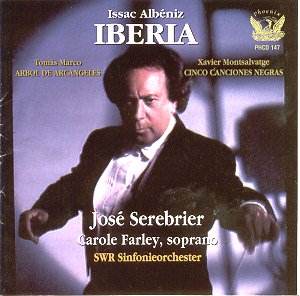Isaac ALBENIZ
Iberia
Tomas MARCO Arbol de
Arcangeles
Xavier MONTSALVATGE
Cinco Canciones Negras
Maurice RAVEL
Bolero
Manuel de FALLA La Vida
Breve (Interlude and Dance No. 1); El Amor Brujo (Ritual
Fire Dance).
 Carole Farley (sop)
Carole Farley (sop)
Sudwestrundfunk Sinfonieorkester/Jose Serebrier
 PHOENIX PHCD 147
[67.33]
PHOENIX PHCD 147
[67.33]
www.phoenixcd.com

Serebrier is one of those conductors peripheral to the catalogue but well
worth watching for. His status outside the 'great' circle seems more to do
with his nomadic course from label to label - orchestra to orchestra. His
association with Reference Recordings bore an artistic harvest out of all
proportion to its meagre reception by the review establishment. His stimulating
Sheherazade is very fine indeed. Now he pops up with a good German
Radio orchestra and in the sort of anthology that hales from a bygone era.
The orchestra we know from their various Hänssler releases but, in times
gone by, they were a house-band with Vox as well. Their exuberant and skilled
performances well serve Serebrier who never allows tired received styles.
He is not wonderfully served by the venue which is warm at lower volumes
but which clouds when the music becomes boisterous.
There are some magical effects as at the end of the El Puerto in
Iberia but the louder sections, while thumpingly positive, suffer
from a smearing of individual lines. The ambience suits Marco's Britten-like
Arbol de Arcangeles (1995), full of punch, which is for string orchestra.
After the peppery douche of the Marco the Montsalvatge (once recorded for
EMI Hispavox by de Los Angeles - still a classic) is a benison. Farley
has just the voice for this music (closely focused by the engineers though
not suffocatingly so) though I had my slight doubts about the accent in
Chevere. Her voice runs the gamut from girlish smiling soprano to
the blackest alto shadows. If you are taken with the Granados songs then
you will want this. In fact I rather hope Farley will record some Granados
and the de Falla Siete Canciones. The Bolero is taken without
languor at [13.40]. In the notes, Serebrier indicates that he has been influenced
by Ravel's own recording. The de Falla snippets are acceptable makeweights
with El Amor poundingly done; so well indeed that I would have liked
to hear Serebrier in the complete suite. I dream that one day Serebrier will
discover the orchestral music of Joseph Marx. His way with those bejewelled
scores would make him a natural for Marx's Herbstsinfonie and
Natur-trilogie as would the orchestral song cycle Verkärtes
Jahr with Farley.
Meantime, not perhaps the rush out and buy disc Phoenix might have
hoped but certainly one worth tracking down for Serebrier's way with
Bolero and Farley's Montsalvatge cycle.
Rob Barnett
www.phoenixcd.com

